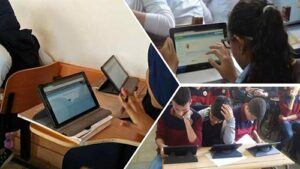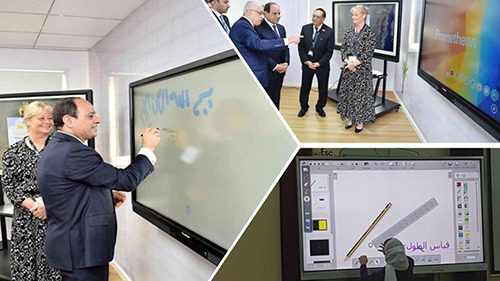Education in Egypt is like a classic vehicle that is showing its age. New paint, an oil change or two, bald tyres swapped for ones with tread, swanky seat belts and still it does not perform as new. Look under the bonnet and tremble. No one has re-bored the pistons or valve ports. Fan belts are loose and timing chains looser.
Education is about space, tools and investment in a future that will become apparent in two or three generations’ time. For years, education has been an ordeal for everyone: parents, teachers and students, whose aim is not the broadening of intellectual horizons. Rather grades on the final report are the “brief sounds that determine weal or woe”. The taught masses and their parents have too often been held to ransom by underpaid, overworked teachers, who tout private tuition as a means to supplement meager incomes.

However, much effort has been made in the preparation of a new education system, which was launched in 2018. In the same year, the state invested in digital technologies and has updated electronic resources. Why should the nation’s youngsters have to break their backs under the weight of text books when all teaching materials can be stored on an I-pad? And think of the space saved when lockers are taken out of school corridors. The state is working to solve many problems that have accumulated over the years. Overcrowded classrooms are no conducive to teacher-student rapport. Many school buildings are in dire need of maintenance. Teachers’ pay and conditions are to be radically overhauled. Finally, education must move from a culture of exam scores to learning, acquisition of life skills and building character.
Indeed, such are the problems to be addressed but pre-university education has witnessed remarkable progress during the era of President
Abdel Fattah El Sisi after decades of the doldrums and half-hearted attempts at problem-solving.
Steps have already been taken to transform education from a process of cramming for examinations to genuine learning and fostering innovation.
“Achieving maximum benefit from the integrated system that provides the students with information and gives them various skills to shape their intellect and achieve Egypt’s 2030 vision and strategy,” said Minister of Education and Technical Education Tarek Shawky.
The ministry is implementing the state’s plan for a modern education system based on the most up-to-date international standards.
In the meantime, the success of the system will rest primarily with teachers.
Teacher training and inset courses aim at developing their skills to put the new programmes into practice. Teachers will become facilitators, teaching skills of deduction, research, and basically learn how to learn, which will be a far cry from memorisation of facts and figures that will be forgotten immediately after the examination.
Acting on instructions from President Sisi’s the ministry seeks to integrate pupils with special needs in mainstream education and give them the opportunities to realise their ambitions after they leave school.
The ministries of education and communications have been working together with teacher training institutes to give teachers grounding in special needs teaching along with developing their technological skills to facilitate communication with special needs students.
The ministry is providing a new financial package for teachers at a cost of LE6.6 billion and approved a 50 per cent increase in the monthly performance-related bonus and 25 per cent bonus based on examination results.
In order to reduce overcrowding in schools, the ministry has built 25,000 classrooms between July 2019 and December 2020.
Within the presidential Decent Life initiative more than 19,200 classrooms and 94 schools have been built in some of the most deprived rural areas.
For the academically gifted, 54 centres have been established and more than 50 Egyptian-Japanese schools are to be set up.
Between 2016 and 2020, schools nationwide underwent maintenance, ranging from simple and urgent to full refurbishment for 154 schools with funds from Germany, Japan and Kuwait.
Under the adult literacy programme, 3.2 million people are now literate, thanks to the efforts of 104,000 teachers in 116,000 classrooms across the country.
The ministry has also carried out the directives from President Abdel Fattah El-Sisi to expand Egypt’s presence in the African continent.
The Egyptian education mission has returned to Somalia, and several Arabic language teachers have been loaned to Togo and Uruguay. Egyptian schools are being established.
National Centre for Examinations and Educational Assessment, under ministry supervision has created knowledge and question banks.
In the meantime, the ministry has been integrating the new curricula to the new system with the help of UNICEF.
Each student in first grade of secondary school was given a tablet with a huge memory. Goodbye bags of textbooks.
Student health is covered by the presidential initiative ‘100 million healthy people’ which includes virus C tests for 20 million students. There are also campaigns underway to eradicate stunting and anemia for primary school students.
The new educational platform (Edmodo) was also launched during the full and partial closures of schools during the coronavirus pandemic.
An electronic library for syllabuses for all grades in Arabic and English has been made available while 26,000 interactive screens were given to first-year secondary students in December 2018.
Examinations are to be performed and corrected electronically.
Vocational education, which has received great impetus after years of neglect, now uses the applied technology schools system, as one of the steps towards creating the educated Egyptian craftsman.
Nineteen applied technology schools were opened in the last three years.
Schools of Applied Technology are model schools for vocational education, applying the international standards in the methods of teaching and training.






Discussion about this post